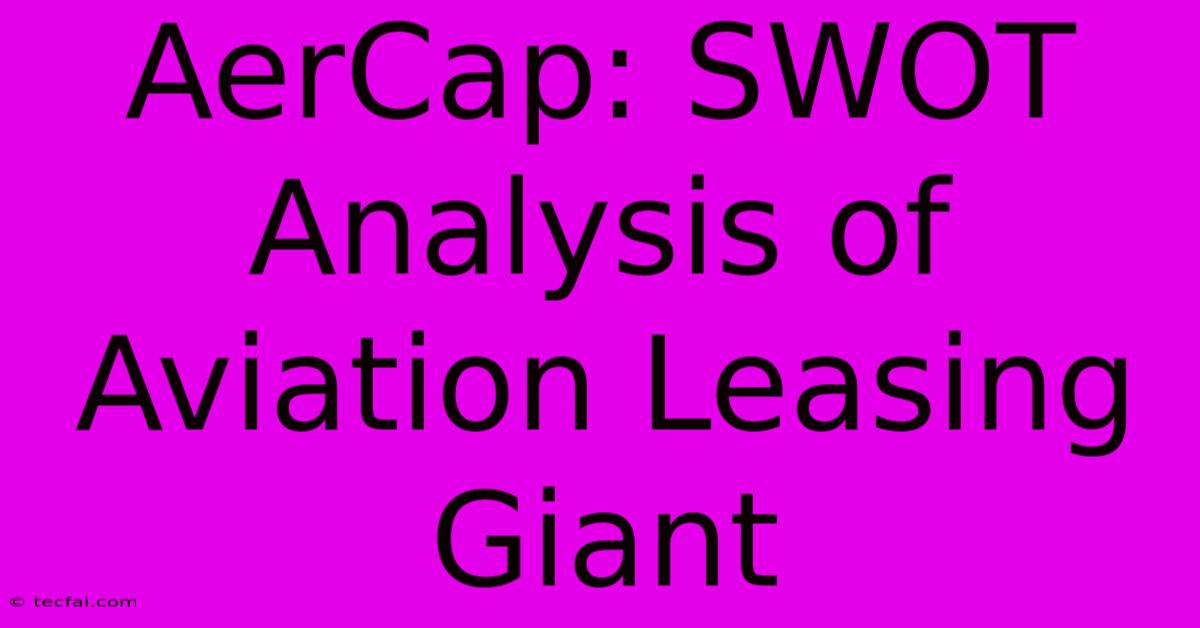AerCap: SWOT Analysis Of Aviation Leasing Giant

Discover more detailed and exciting information on our website. Click the link below to start your adventure: Visit Best Website tecfai.com. Don't miss out!
Table of Contents
AerCap: SWOT Analysis of Aviation Leasing Giant
AerCap Holdings N.V. (AER) is a global leader in aircraft leasing, dominating the industry with a vast fleet and an expansive network. As the world of aviation continues to evolve, understanding AerCap's strengths, weaknesses, opportunities, and threats is crucial for investors, industry professionals, and aviation enthusiasts alike. This SWOT analysis delves into the key factors shaping AerCap's future, examining its current position and potential for growth.
Strengths:
- Market Dominance: AerCap boasts the largest aircraft leasing fleet globally, with a diverse portfolio spanning over 2,000 aircraft. This scale provides significant negotiating leverage with airlines, enabling AerCap to secure favorable lease terms.
- Financial Strength: With a strong balance sheet and access to ample capital, AerCap enjoys a competitive advantage in acquiring new aircraft and navigating industry fluctuations. Its financial stability ensures the company can withstand economic downturns and capitalize on opportunities.
- Global Reach: AerCap operates in a truly global market, serving airlines across all continents. This broad geographic reach ensures diversification and exposure to various regional growth opportunities.
- Experienced Management: AerCap is led by a seasoned management team with extensive experience in the aviation leasing sector. Their expertise and network contribute significantly to the company's success.
- Technology & Innovation: AerCap has embraced technology to streamline operations and enhance its services. Its digital platform for lease management and data analytics allows for efficient decision-making and improved customer service.
Weaknesses:
- Concentration Risk: AerCap's significant dependence on the airline industry exposes it to potential disruptions due to economic downturns, geopolitical events, or global pandemics.
- Competition: The aviation leasing market is becoming increasingly competitive, with the emergence of new players and aggressive growth strategies by existing competitors.
- Dependence on Aircraft Manufacturers: AerCap relies heavily on aircraft manufacturers like Boeing and Airbus. Any delays or production issues with these companies can impact AerCap's delivery schedules and profitability.
- Regulatory Environment: The aviation industry is subject to strict regulations, which can change frequently and impact AerCap's operations and costs.
- Environmental Concerns: The industry faces growing scrutiny over its environmental impact, particularly regarding greenhouse gas emissions from air travel. This can lead to increased regulations and potential cost pressures for airlines and leasing companies like AerCap.
Opportunities:
- Emerging Markets Growth: The aviation industry is experiencing rapid growth in emerging markets like Asia and Africa. AerCap can capitalize on this by expanding its presence in these regions and providing leasing solutions to new airlines.
- Sustainable Aviation: The industry is actively pursuing sustainable solutions to reduce its environmental footprint. AerCap can invest in newer, fuel-efficient aircraft and support airlines' efforts to achieve carbon neutrality.
- Digital Transformation: AerCap can further leverage technology to enhance its operations and services, potentially offering data-driven solutions for airlines and optimizing its fleet management.
- Consolidation: The aviation leasing market is ripe for consolidation, with opportunities for AerCap to acquire smaller competitors and expand its market share.
- New Aircraft Types: The development of new aircraft models, such as electric and hybrid aircraft, presents an opportunity for AerCap to invest in innovative technologies and capture early market share.
Threats:
- Economic Downturn: A global economic downturn could significantly impact air travel demand, leading to lower airline profitability and reduced leasing demand.
- Geopolitical Instability: Conflicts and political tensions can disrupt air travel routes and impact airline operations, potentially leading to reduced demand for leased aircraft.
- Fuel Price Volatility: Fluctuations in fuel prices can impact airline operating costs and profitability, influencing their leasing decisions.
- Technological Disruption: Emerging technologies like autonomous flight or hyperloop transportation could disrupt the traditional aviation industry and affect the demand for leased aircraft.
- Environmental Regulations: Stringent environmental regulations could drive up operating costs for airlines and lead to higher lease rates, potentially making leased aircraft less attractive.
Conclusion:
AerCap is a formidable player in the global aviation leasing market, leveraging its size, financial strength, and experienced management to navigate the complexities of the industry. While challenges exist, AerCap's strategic focus on growth, innovation, and sustainability positions it to capitalize on emerging opportunities and secure its leadership position in the years to come. By carefully assessing its strengths, weaknesses, opportunities, and threats, AerCap can continue to shape the future of aviation leasing and contribute to the growth and evolution of the industry.

Thank you for visiting our website wich cover about AerCap: SWOT Analysis Of Aviation Leasing Giant . We hope the information provided has been useful to you. Feel free to contact us if you have any questions or need further assistance. See you next time and dont miss to bookmark.
Featured Posts
-
Tik Tok Canada Ordered To Wind Down
Nov 07, 2024
-
West Indies Clinch Series Win Over England
Nov 07, 2024
-
Brugge Se Oorwinning Oor Aston Villa
Nov 07, 2024
-
Stranger Things Season 5 Cast Plot Release
Nov 07, 2024
-
Live Election Updates Flathead Beacon Montana
Nov 07, 2024
